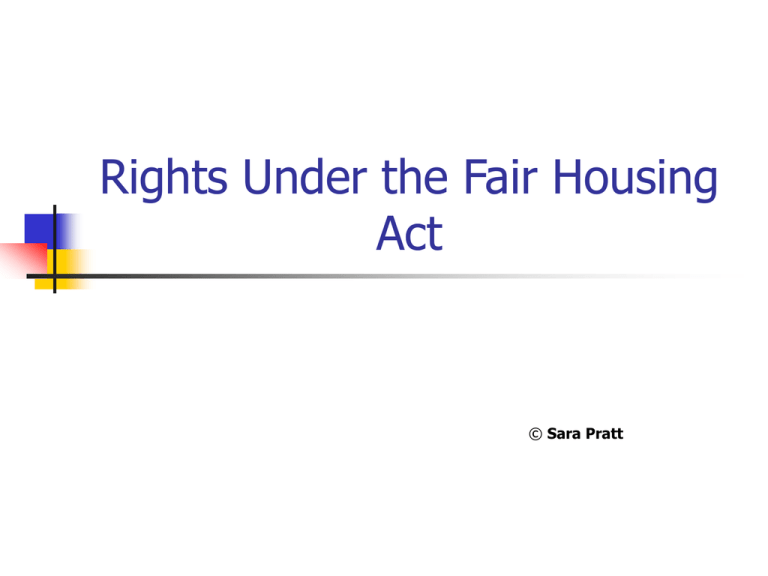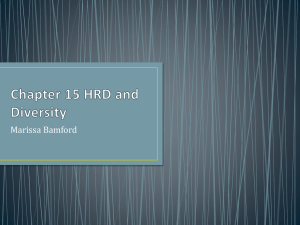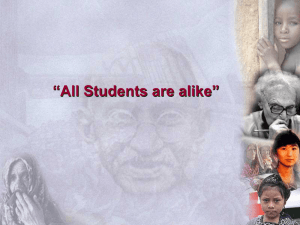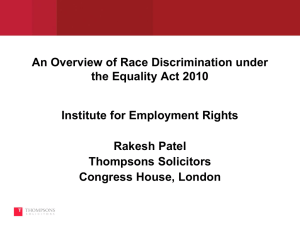
Rights Under the Fair Housing
Act
© Sara Pratt
The Fair Housing Act
Was first passed in 1968, after the
assassination of Dr. Martin Luther King.
Was significantly strengthened when it was
amended in 1968.
o
o
o
Two new coverages—disability and familial
status—were added.
Enforcement rights were added to provide
government representation when an investigation
finds a violation.
Punitive damages are allowed without a cap, and
civil penalties can be awarded in an administrative
hear.
Introduction
The Fair Housing Act applies to virtually all
types of housing, public and private, and
virtually all types of housing-related
transactions.
Through regulations that have the force of
law, HUD has further defined the general
provisions of the Fair Housing Act.
The Fair Housing Act is properly referred to
as the federal Fair Housing Act as amended,
or Title VIII.
Illegal versus Unfair
There are many ways to discriminate—
not all forms of discrimination or unfair
treatment are illegal.
Jurisdiction
A complaint must be filed within certain time frames.
o
o
o
Administrative complaints must be filed with HUD within one
year from the last date of discrimination 42 USC 3610 (a).
A lawsuit must be filed within two years from the last date
of discrimination 42 USC 3613 (a)(1)(A).
State and local agencies may have shorter time frames for
filing complaints.
Any “aggrieved person” may file a complaint 42 USC
3601(i).
Virtually all housing-related transactions are covered.
Virtually all person and entities engaged in housingrelated transactions can be respondents/defendants.
Housing Covered
Dwellings
o
Any building, structure or portion thereof
which is occupied as, or designated or
intended for occupancy as a residence by
one or more families, and any vacant land
for the sale or lease of a dwelling. 42 USC
3602 (b).
The Code Exempts Some Entities
and Some Transactions
Exempt Entities
Housing which contains 4 or fewer units where the owner
maintains and occupies one of the units. 42 USC 3603 (b)(2).
Single family housing when the owner sells or rents it, where
there’s only one sale within 24 months, there’s three or fewer
houses owned, and if it is sold or rented without sales or rental
services of a real estate broker and without a discriminatory ad
or notice. 42 USC 3603 (b)(1).
Note that the prohibition against discriminatory
advertising or statements still applies to these
properties. 42 USC 3603 (b).
Note that other statutes, 42 USC 1981 and 1982, still
apply to discrimination based on race, national origin
and some forms of religious discrimination.
Exempt Transactions
Housing for Older Persons permits
discrimination based on familial status.
o
o
All residents are 62 or older.
55 or older housing, if 80% of occupied units
occupied by at least one person who is 55 or older
and where the property holds itself out to be
housing for older persons, where there are
significant facilities and services for older persons
and engages in age verification procedures. 42
USC 3607(b).
Actions Permitted
Conduct against a person because he or she
has been convicted of illegal manufacture or
distribution of a controlled substance. 42 USC
3607 (b)(4).
Denial or limitation of rental to persons
whose tenancy poses a clear and present
threat of substantial harm to others or to the
dwelling itself. 42 USC 3604 (f)(9).
It is unlawful…
For any person (one or more
individuals, partnerships, associations,
corporations, joint-stock companies,
labor organizations, mutual companies,
joint stock companies, trusts,
unincorporated organizations, trustees,
trustees in case under Title 11,
receivers and fiduciaries. 42 USC
3602(d).
To Discriminate Because of:
Race
o
Color
o
Black/White, African-American/Caucasian.
Skin tone.
Religion
o
Religious beliefs or membership in a
religious group.
OR Discriminate Because of:
Sex
o
National Origin
o
Gender.
Country of origin of a person or his/her ancestors.
Disability
o
o
o
Physical or mental impairment which substantially
limits one or more major life activities.
Having a record of having such an impairment.
Being regarding as having such an impairment.
OR Discriminate Because of:
Familial Status
o
Having one or more individuals who are
under 18 being domiciled with:
A parent or another with legal custody.
A parent’s designee or other person having
custody with the written permission of a
parent.
Being pregnant.
In the process of securing custody of an
individual under 18. 42 USC 3602(k).
The Fair Housing Act covers many
different types of transactions
It is illegal:
o
To refuse to sell or rent to a person who
has made a bona fide offer, because of
race, color, religion, sex, familial status, or
national origin, or to discriminate against
any person in the sale or rental of a
dwelling because of handicap. 24 CFR
100.60 (a).
Specific Prohibitions
Specifically, it violates the law, in a sale or
rental transaction to:
o
o
o
o
o
Fail or refuse to accept a bona fide offer.
Refuse to sell or rent or to negotiate for sale or
rental.
Impose different prices or charges for sale or
rental.
Use different qualification standards or
procedures.
Evict tenants because of their race, etc. or the
race, etc. of their guests. 24 CFR 100.60.
Other Specific Provisions
It is also illegal to:
o
o
o
o
o
Discriminate in the terms or conditions of housing
or in the provision of services or facilities in
connection with housing.
Engage in conduct which makes dwelling
unavailable or denies dwellings.
Represent to a person that a dwelling is not
available when it is available.
Fail to provide or deny maintenance or repairs.
And there are others. 24 CFR 100.65, 100.70.
It is Unlawful to Engage in
Other Discriminatory Practices
To deny any person access to
membership in, or participation in, or
other benefit of any multiple listing
service or any other housing related
service.
It is Unlawful to Make
Discriminatory Statements of Acts
To make, print, or publish or cause to be
made, printed or published.
Any notice, statement or advertisement.
In connection with the sale or rental of a
dwelling.
That indicates a preference, limitation or
discrimination or an intention to engage in
discrimination. 24 CFR 100.75.
Other Forms of Discrimination
To induce or attempt to induce to sell or rent any
dwelling by representations regarding the entry or
prospective entry into a neighborhood of persons of a
particular race, etc. Segregation and Blockbusting are
Prohibited.
To restrict, by word or deed, the housing choices of
an individual and to perpetuate segregated housing
patterns.
To induce, or attempt to induce, a person to sale or
rent a dwelling based on representations regarding
the entry or prospective entry into a neighborhood of
persons of a particular race, etc.
Lending Discrimination is
Prohibited
The Fair Housing Act prohibits discrimination
in residential real estate—related
transactions:
A residential real estate—related transaction
in the making or purchasing of loans or in the
terms or conditions of loans.
o
o
o
Where the loan is to purchase, construct, repair or
improve a dwelling, is secured by real estate.
This practice includes discrimination in the selling,
brokering, insuring or appraising of real property.
24 CFR 100.115.
Prohibited Lending Practices
It is illegal to:
o
o
o
o
Discriminate in the making of loans or other
financial assistance.
Refuse to give a person information about loans or
application requirements or to provide incorrect
information about loans.
Discriminate in the terms or conditions of loans.
Discriminate in the purchase of loans. 24 CFR
100.120, 100.125.
Insurance Discrimination
It is illegal to:
o
Refuse to provide…property or hazard
insurance…or to provide such…insurance
differently. 24 CFR 100.70(d)(4).
Discriminatory Practices Based
on Disability
To refuse to sell or rent or refuse to negotiate
for the sale or rental of a dwelling or to make
a dwelling unavailable, or to discriminate in
the terms or conditions of a sale or rental or
in the provision of services or facilities:
o
o
o
Based on the disability of buyer or renter.
Based on the disability of a person residing in or
intending to reside in the dwelling.
Based on association with a person with a
disability.
Denial of Reasonable
Accommodations
A refusal to make reasonable
accommodations in rules, practices,
policies or services when the
accommodations are necessary to allow
the person an equal opportunity to use
the dwelling.
Denial of Reasonable
Modifications
A refusal to permit, at the expense of
the disabled person, reasonable
modifications of existing premises.
o
o
If the person is to live in the unit.
The landlord may reasonably condition
approval on the renter’s agreeing to
restore the interior of the unit to the premodification condition, reasonable wear
and tear excepted.
Design and Construct
Accessible Housing
Fail to design and construct buildings
with four or more units to be accessible
to people with disabilities.
o
o
All units if the building has an elevator.
The ground floor units if the building does
not have an elevator.
There are Seven Key
Elements:
Accessible route to every covered unit.
Accessible public and common use areas.
Accessible doors.
Accessible routes inside units.
Light switches and other environmental
controls must be reachable.
There must be reinforcements in walls for
grab bars.
Usable kitchens and bathrooms.
Illegal Inquiries
It is illegal to inquire about the nature or
severity of a disability except:
o
o
o
o
To determine if a person is eligible for a priority.
To determine if a person is qualified for a dwelling
that is only available to people with disabilities.
To make the usual non-discriminatory inquiries
about qualifications.
To ask if someone is a current illegal drug user or
if the person has been convicted of the illegal
manufacture or distribution of a controlled
substance. 24 CFR 100.202 (c).
Harassment in Housing is
Illegal
One common form of harassment is sexual
harassment in housing.
o
o
o
It can occur by physical conduct or through words.
It can be done by property employees or
residents.
It can occur when there’s a trade-off proposed, or
where the harassment is so pervasive and severe
that it becomes a term or condition of housing.
Racial Harassment is Illegal
Racial harassment can occur in housing
as well.
o
It is generally experienced as being
pervasive and severe so that it amounts to
either a term or condition of housing, or as
an interference with the right to live free
from discrimination in housing.
Landlord Liability in
Harassment Cases
In order to hold the landlord liable
when harassment occurs between
residents, you may have to show that
the landlord knew of the harassment or
that the landlord should have known of
the harassment and failed to take action
to show liability.
Coercion, Intimidation and
Retaliation are Prohibited
It is unlawful for any person:
o
To coerce, intimidate, threaten or interfere with
any person in the exercise or enjoyment of, or on
account of his having exercised or enjoyed any
right under the law or because the person has
aided or encouraged any person in the exercise of
his rights. 42 USC 3617.
May also amount to a criminal violation, 42
USC 3631.
Steering is Illegal
Steering is the restriction of a person’s
choices in housing by words or conduct.
o
o
It includes discouraging a person from looking at,
buying, or renting a house because of their race,
etc. or because of the race, etc. of people in a
community or a neighborhood.
It is also described as directing a person to or
away from a particular area or neighborhood
based on that person’s race, etc., or based on the
racial or ethnic composition of a neighborhood.
24 CFR 100.70 (c).
Special Issues
Zoning and planning decisions.
o
o
Race and national origin issues in siting
housing.
Disability issues in citing and operating
housing.
Occupancy Standards.
Proof
Overt discrimination.
Unequal treatment.
Denial of reasonable accommodations,
reasonable modifications, or failure to
design and construct accessible
housing.
Neutral policies that operate to
discriminate.
Intent
While some cases allow proof that the
wrongdoer INTENDED to discriminate,
most cases don’t require such proof.
Intent is shown through what
happened.
Even well-intentioned acts can be
discriminatory.
Remedies
HUD ALJ administrative hearing or DOJ
lawsuit for administrative complaints or
private lawsuit, no exhaustion requirement.
o
o
Injunctive relief to completely correct violations.
Compensatory damages:
o
Out of Pocket expenses, including lost profits.
Damages for mental distress.
Punitive damages/civil penalties.
Purpose of the Fair Housing
Act
One country, one community.








